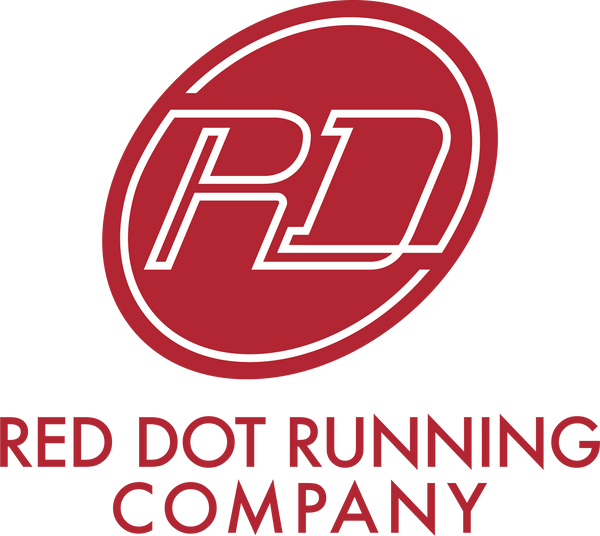Happy International Women's Day! 🌸 As we honor the strength, courage, and resilience of women worldwide, we look at our own everyday female heroes - our RDRC Ambassadors who are showing up everyday. Despite overwhelming challenges, through sickness and exhaustion, these ladies show us how being your best isn’t about hitting PBs all the time. Rather, it's about finding balance while striving to be better, and looking after yourself so that you can continue to give your best.
Read on to discover how they address racing and recovery strategies, balance work and family with training, and why a positive mindset can’t be underestimated.
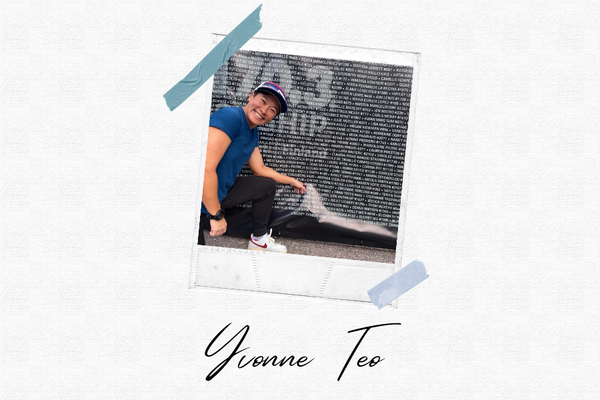
Yvonne's passion for competition ignited with the challenge of an Ironman 70.3 for her 40th birthday, spurred on by the gift of a Garmin watch from her partner. This milestone event marked the beginning of an addictive pursuit of triathlon, blending her love for travel, culture, and community through races around the globe.
"Building a community of triathletes (Singapore Women's Triathlon Club) is a massive part of my motivation to support and feel supported by women." —Yvonne Teo
What drives your passion for competition?
I decided to challenge myself with an Ironman 70.3 for my 40th birthday, which turned into an addictive pursuit. I was on a high for weeks after the first race—it was a great venue, and I felt like anything was possible. That's how it started. I'm selective of where I race; I enjoy races in new locations to blend travel and competition. Different sights, people, and cultures keep things alive and interesting. I've made some great friends just from meeting them at races!
Building a community of triathletes (Singapore Women's Triathlon Club) is a massive part of my motivation to support and feel supported by women. Some of my deeper relationships have begun here, and I'm very grateful for this community. Sometimes racing can get stale, and one wonders why you're doing yet another brick on a burning Sunday - and having those friends lifts you up and makes me laugh. Plus, you can compare chafe marks.
How does the sport you specialize in challenge you physically and mentally?
The challenges overlap - there are three disciplines, and the time management piece of training, balancing work, family, and rest (and recreation) for me takes a lot of effort plus organization. The actual training set or race is pretty straightforward - I love pushing myself and getting some quality Me Time. It takes consistency to keep all things in balance, enjoy it, and stay injury-free.
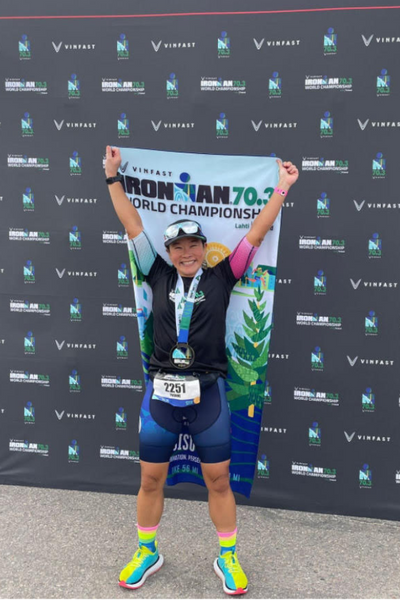
How do you maintain peak conditions, and could you highlight any specific routines crucial for your performance?
My training routine involves structured workouts that include a mix of cardiovascular exercises, strength training, and drills. I try to stay on track, but I let some days go ( and not feel bad) when I'm tied up with work or family. Recovery and sleep are essential for me, and I make sure I have a regular sleep schedule with a minimum of 7 hours. I look forward to rest days and booking regular sports massages for muscle recovery and injury prevention. I don't have a specific diet now, but I am trying to keep a balanced diet. I also treat myself, and food is not a reward for exercise.
What are your go-to strategies for fueling before, during, and after races to ensure optimal endurance and recovery?
I train and race with almost the same fueling strategy! Tailwind is my go-to for both the bike and run. For my 90-100k bike rides, a concentrated bottle of berry-flavored Tailwind infuses my ride with sustained energy. Accompanying it is a hydration drink – a bottle of water enriched with electrolytes. Mid-ride, I turn to gels and a tasty snack. Love the Veloforte bars! I fine-tune the quantity and type for races depending on the location and weather.
Post-ride, it's Tailwind Recovery within 30-45 minutes, and to stay on top throughout the day, I keep sipping on water infused with Bix. For the run, it's a soft flask with a Tailwind and water mix.
Could you offer specific nutrition and wellness tips that have significantly impacted your athletic performance and overall health?
Prioritizing a balanced diet has been crucial. I try to incorporate lean proteins like chicken and fish, complex carbohydrates from whole grains, and ample fruits and vegetables. Hydration is paramount; I aim for at least 8 glasses of water daily. Before exercise, I sometimes have an energy bar or a banana. Adequate sleep is a priority; 7-8 hours daily is non-negotiable.
What's the best advice you've ever received on your sporting journey?
Keep your body cool in hot races, and put ice in the back of your tri-suit!
What's the biggest challenge you've overcome on your sporting journey?
Self-doubt—and I'm still on a journey with it, learning to hear it, work with it, and also put it aside. I've definitely had days where I feel like an imposter wearing a World Champs Finisher T-shirt! Maybe the second biggest challenge is getting up early—I'm not an early riser by nature.
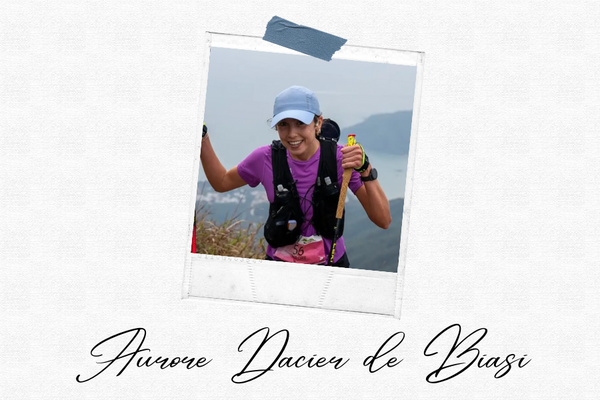
Aurore Dacier de Biasi is a commercial lawyer based in Singapore who spends her free time training for, and competing in, endurance races that would wow even seasoned athletes. Her past struggle with RED-S, an energy deficiency syndrome that impacted her training and health, has taught her to listen to her body and the importance of a solid nutrition strategy.
"Running has taken me to places I would have probably never seen and introduced me to people I would have otherwise never crossed paths with. For this, I am forever grateful." — Aurore Dacier
Please briefly overview your journey into endurance sports and what drives your passion for competition.
Growing up in the south of France and California, I was spoiled by the fantastic outdoors, and I've always enjoyed playing outside. Hiking, running, cycling - the longer the adventure, the better! Funny enough, I only found out that trail running was an actual sport in 2020 when a friend of mine invited me for my first trail race in the Belgium Ardennes (out of all places!!!). As for my homemade adventures, I enjoyed the longer distances the most. I decided to commit to this sport and invest my time into becoming an endurance athlete to run in the most beautiful places and participate in all the races I dream about.
I love to compete because it allows me to push my limits in a way that I would never be able to without the exhilarating race environment. However, my favorite thing about races is the feeling of belonging to a community of people who share the same passion.
How does the sport you specialize in challenge you physically and mentally?
Because I am relatively new to ultra-distances, I need to be careful and patient to make sure my body is ready to absorb the heavy load of training and racing that I want to do. Although I now have a coach and a training plan, I often get carried away and run more than I should, which has led me to the physio's office too many times. A year ago, I had a stress fracture on my shin, which was caused by over-training, and as a result, I had to completely stop running for 6 weeks. I was highly disappointed in myself because it was a rookie mistake. I should have listened to my body, but in the end, I learned so much during this process.
Although it is not always easy to deal with the frustration, I feel like I am making progress daily.
How do you maintain peak condition, and could you highlight any specific routines crucial for your performance?
I wish I was always in peak condition, but life can get busy, and it is not always possible. I work as a full-time lawyer, I train every day, and I also like to maintain a social life. To keep a good level of shape throughout the year, I keep things relatively simple: rest, fuel, and hydrate. Any athlete must cover this base before adding any fancy recovery or performance treatment.
For me, this routine looks something like this: I would try to get 7h of sleep daily, I have breakfast before my training (overnight oats, for example), train, then I go to the office and have another breakfast there (usually Greek yogurt, granola, banana), then lunch/diner and most importantly – water with electrolytes throughout the day!
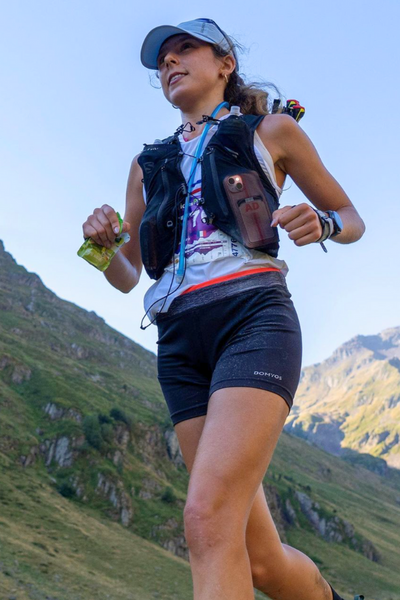
What are your go-to strategies for fueling before, during, and after races to ensure optimal endurance and recovery?
I started making minor changes to my diet approximately 1 week before the race by substantially decreasing my fiber intake and switching to more basic meals. This can be plain rice with a source of protein, for example. The night before the race, I usually have rice and tuna or eggs, no sauce, and drink a lot of water. I have my last meal approximately 2 hours before the start of the race, and it's usually the same as my dinner: rice and eggs and lots of water.
I use the BIX electrolytes daily but also during the race. The grapefruit is my favorite flavor. I use a mix of solid, usually more during the first few hours, and liquid nutrition during the race. I was introduced to Tailwind when I joined the RDRC, and this is now my go-to for any long outing, even during my training. It is not sweet, and the composition is probably the best I have seen regarding the macro-ratio. I am thrilled with it! After the race, I return to the basics: sleep, water with BIX recovery mix (the mango ones are my favorite), and whole and nutritious food (with loads of carbs and protein).
Could you offer specific nutrition and wellness tips that have significantly impacted your athletic performance and overall health?
#1 fuel properly. I fuel before and after my training. This helps tremendously with my recovery and allows me to train at my complete potential daily. I focus on eating quality food and hitting my protein target.
#2 Drink a lot. Especially if you train outdoors in Singapore, the heat and the humidity can be brutal. I take electrolytes throughout the day to ensure I have all the minerals and stay well hydrated.
What's the biggest challenge you've overcome on your sporting journey?
Last year, I had an energy deficiency syndrome (RED-S), which caused my body to slowly shut down and seriously impacted my health. I've had amenorrhea for more than a year and a half and then a stress fracture on my shin. It was extremely challenging to be away from running for more than 6 weeks and not understand what was going on. I had never heard of the RED-S syndrome at the time, and I wish I had been educated to spot the first signs.
I believe more prevention should be done, especially with women endurance athletes. Luckily, I met a great physio who guided me through my recovery but also pointed me to the relevant resources to understand more about this syndrome and recover. It took me a long time to get my body back in shape, and I learned so much throughout the process.
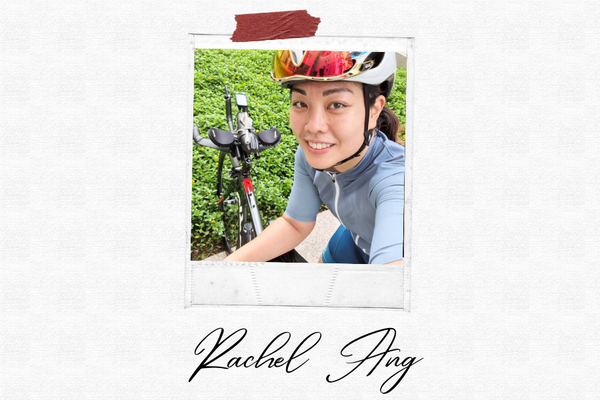
Rachel Ang's journey into endurance sports began in her school years with sprints and kayaking, transitioning to marathons and cycling following an injury. Today, her focus is on cycling and triathlons, embracing the challenge of learning to swim as an adult to meet her triathlon goals. Her approach underscores the importance of personalizing nutrition and wellness strategies to enhance athletic performance and overall health.
"I've reached a point in my life where maintaining fitness is more important than constantly striving for a high standard." —Rachel Ang
Can you share a brief overview of your journey into endurance sports and what drives your passion for competition?
I've been active since school. I used to do sprints and longer distances for kayaking. I had an injury towards the end of school, and I started trying other things, like joining marathons. Eventually, almost 10 years ago, I bought my first road bike. Like they say, the rest is history.
How does the sport you specialize in challenge you physically and mentally?
My primary focus is cycling, but I also participate in triathlons, which was my original goal when I purchased my first road bike almost a decade ago. As an adult, I also learned to swim, a task that was far from easy but one that I embraced as part of my evolving athletic journey.
How do you work to maintain peak condition, and could you highlight any specific routines that are crucial for your performance?
My regular work can be demanding, and I used to stress about not being able to devote enough time to cycling or running. These days, I'm more forgiving of myself. Instead of mindlessly pushing hard, I focus on training smart. I incorporate a lot of conditioning, strength training, and long, slow runs—activities I never would have considered a decade ago.
What are your go-to strategies for fueling before, during, and after races to ensure optimal endurance and recovery?
Learning from experience, I don't go out for a long ride or run empty anymore, and I plan to fuel myself when I feel hungry. My ride bottles are always filled with Tailwind, especially if I'm out for more than 2 hours.
Could you offer specific nutrition and wellness tips that have significantly impacted your athletic performance and overall health?
Each person is unique, and while learning from others is beneficial, you'll need to develop your winning formula. This is particularly crucial for more extended events. Always test your nutrition plan during your training sessions to ensure it's effective!
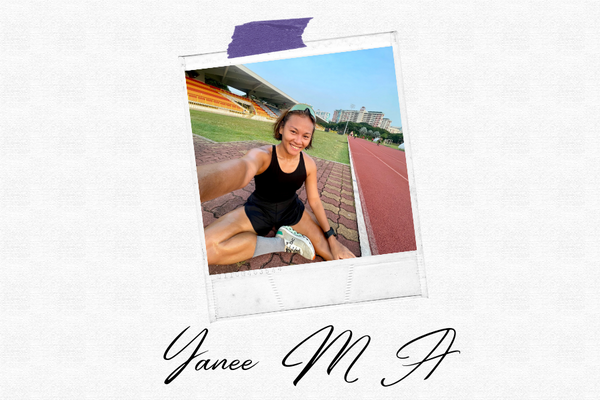
Meet Yanee, an athlete who loves to make the impossible possible. Despite starting her sporting journey later, this lady is a force to be reckoned with. Juggling work, caring for her elderly parents and training means a strict schedule that prioritizes mental wellness, while also leveraging a data-backed approach to maximize her efforts in training and nutrition.
"I need to start caring for myself before I take care of the whole village. Spare that hour a day to do something that you like. Make yourself happy!" — Yanee M A
What drives your passion for competition?
I am a late bloomer in running, cycling, and especially swimming! I took up running in pursuit of shedding the excess weight, but I ended up being passionate about it. I attempted three full marathon races in 3.5 months, breaking PBs at each one, with 4:05 hr being the last one.
Afterwards, I became interested in triathlons but couldn't cycle or swim! I crazily signed up for duathlon and triathlon races. I took up personal coaching services to learn both disciplines. I placed on the podium for both races and didn’t look back! Some say it was beginner's luck but for me, it was pure grit and determination. I am currently chasing my dream of completing a number of Ironman 70.3 races to build up to my first full Ironman race.
How does the sport you specialize in challenge you physically and mentally?
Depending on the training block, I have to juggle 3 sports, committing to 8-10 sessions a week. This is very challenging as it takes a lot of planning around my packed schedule.
I work in a corporate role that spans different time zones. My working hours are not for the faint-hearted. I usually work past midnight due to meetings with my global team. I am also caring for my sick, elderly parents, who need constant medical attention. Work, Family, and Triathlon training all in 24 hours, only god knows how challenging this is on me, physically and mentally.
It is physically draining as my sleeping hours are usually 4-5 hours daily due to my commitments. I don't have the luxury of getting 8 hours of beauty sleep. But I am more mentally challenged as there are always too many things going through my mind every single minute, trying to make sure everything is in order and coming up with solutions to every problem. I used to train with a free mind back in 2017-2018. But now when I train, my mind is filled with all my varied responsibilities. Hence, I need a different skill set to deal with it. I am still learning and have been coping with it better lately.
How do you maintain peak condition, and could you highlight any specific routines crucial for your performance?
I listen to my body and learn how to manage the training sessions planned for the week. I am fortunate to have a sports scientist looking at my daily health stats (such as sleeping hours, HRV, and RHR) captured by my watch. That includes my training stats and fatigue levels on Training Peak, and my nutrition on MyFitnessPal.
With all this data, we tweaked the training accordingly in a way that was specific to my personal fitness needs:
A: Taking in enough calories and paying attention to the macros. I was advised to eat to train, not train to eat. I make sure that I fuel my body enough for the intense training session ahead so that I can perform well during the session. I have noticed a difference since I adopted this routine. Thanks to Shawn, who will keep reminding me to eat and eat and eat.
B: I take magnesium before bed. Since I am not getting enough sleep, I depend on magnesium to help me get quality sleep.
C: Taking fruits and Vitamin C to maintain my immunity and prevent getting sick during peaking weeks.
D: Don't be afraid to take a rest day or week at any point in time, whenever you need it. Do not feel guilty. Your body will thank you later!
E: Lastly, don't bulldoze your way through training when sick or injured.
What are your go-to strategies for fueling before, during, and after races to ensure optimal endurance and recovery?
I have gone through a few tests using the continuous glucose monitoring device to find out what works for me, thanks to PerformanceBikeFitter, who sponsored me. CGM devices in sports can monitor your CHO intake during the day and your physical activity, helping you know when, what, and how to enhance your energy supply and, therefore, improve your athletic performance.
I can customize the products that work best for my body with the analysis. So here it is:
A: Three days before race day, I take a beetroot supplement such as Unived Elite Beet. Several studies have shown that nitrates help increase blood flow to our muscles and support oxygen uptake, making them ideal supplements for optimal sports performance.
B: On race day, my pre-race fuel is 2 pieces of Gardenia raisin bread with peanut butter and 1 banana. Not forgetting a black coffee! Double shot for me ;)
C: I used the combinations that worked best for me during the CGM test. I tested a number of brands and combinations, but this works best for my body: Tailwind Endurance with Bix Electrolytes in my cycling and running bottles, supplemented with Untapped Energy Gel. I love the Citrus flavour, as it has extra electrolytes, which is essential since I sweat a lot during workouts. Get this tested, too! The primary guidance for me is to take 90g of carbs per hour.
Post-race, I don't restrict my diet for recovery but prioritize protein.
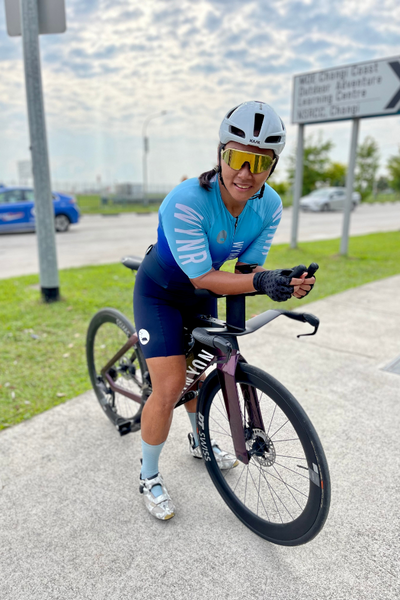
Could you offer specific nutrition and wellness tips that have significantly impacted your athletic performance and overall health?
Most importantly, nutrition. Fuel yourself for better performance. Don't be afraid of food—I used to be! At the same time, try not to train blindly. ALWAYS LISTEN TO YOUR BODY. What works for me might not suit everyone.
What's the best advice you've ever received on your sporting journey?
You are your own limit. Get out of your comfort zone and explore what you are capable of—scared of the water? Try to find ways to get over the trauma.
Need to learn how to swim? Seek professional help.
Why keep saying, "I cannot. I am scared," unless you have really explored all the possibilities?
What's the biggest challenge you've overcome on your sporting journey?
This has to be getting back into fitness after I was floundering during COVID-19, as well as taking care of my sick parents. Handling a dementia mother and a kidney/heart failure father took a huge toll on me! My biggest challenge was trying to continue my training and caring for them 24/7. Let's not forget the enormous stress at work due to COVID-19.
I always self-victimized myself. "Oh, I am tired, I can't workout. Oh, I am so stressed; I will just rest." This went on for so long... Till I realized, hey! I can't pour from an empty cup! I need to start caring for myself before I take care of the whole village. Spare that hour a day to do something that you like. Make yourself happy! I tried to make this possible, and I am in a happier place now.
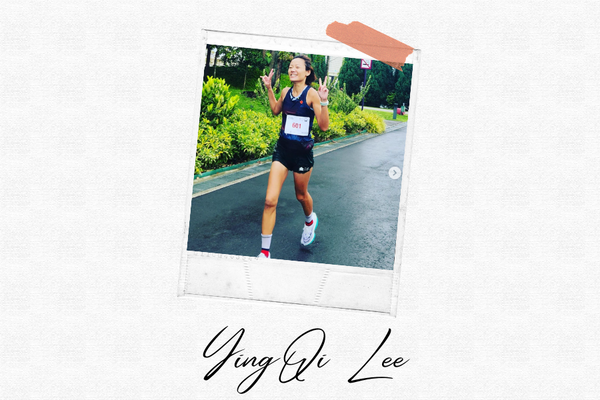
An advocate for wellness, YingQi trains hard but also stresses the importance of rest and good nutrition. While racing and competing are fun, her running gives her an outlet to socialize with a like-minded community that provides encouragement and support. Her biggest fan? Her son, who packs a special pre-race snack box for his mom before every race.
"My go-to pre-race snack is what my son packs for me. It is part of teaching him sports nutrition as well."—YingQi Lee
How has your running and training evolved, and what have you learned from competing in races?
My running evolved from something personal to become something more social. I find like-minded friends who challenge me to be a better version of myself whether I'm running or not. They generously share their experiences on things such as diet and time management. My coach is always there to provide timely feedback and support my emotional needs, as it is not just about hitting personal bests.
Through competitions, I have learned that we train hard to race easily and confidently. I have learned much about my body and how to listen to it. If we work our body hard, we also need to take good care of it. Over the years, I have learned to run happily and be grateful for each race I have completed. There's always a learning point/takeaway and something to be thankful for in each competition!
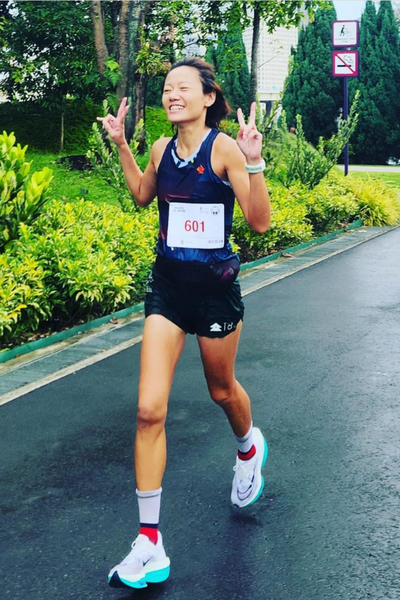
How do you maintain peak condition, and could you highlight any specific routines crucial for your performance?
It is not possible to maintain peak condition all the time. There will be lows and highs. To stay at peak condition, don't overtrain, listen to your body, watch your nutrition, and get sufficient sleep. Taking off days or days is okay if you feel mentally or physically unwell. Strengthen your muscles at least once a week. It is about going far rather than crashing and burning. Being in a club with sound training plans and principles is definitely essential.
What are your go-to strategies for fueling before, during, and after races to ensure optimal endurance and recovery?
My go-to fuel before a race is coffee for the caffeine, bread with banana with peanut butter jam, and mag on energy gel. During a race, it depends on the nature of the race; hydration is probably needed every 5km, and energy/fuel is needed every 50 minutes if the workout is longer than 1 hour.
If the race is long, Tailwind Endurance is an excellent drink to mix in water for easy absorption, especially for those struggling with gut/absorption issues. Bix Recovery is terrific for recovery post-race. Taking care of your pre-, during, and post-race nutrition does wonders for performance; these are what our body needs to make things happen.
Could you offer specific nutrition and wellness tips that have significantly impacted your athletic performance and overall health?
I'm an advocate for wellness! Good nutrition includes three regular meals with macronutrients and micronutrients from fruits, multivitamins, and recovery drinks. Rest is essential for the subsequent day, i.e., at least seven hours of sleep. Warming up and warming down are important routines in addition to strength training.
When you feel an injury coming, fix it by rolling the muscles out and taking an additional rest day without feeling guilty.
Treat your body well. It will serve you well.
To complete marathons and eventually achieve my target after looking into diet and training, I tend to overtrain due to insecurities, and fueling was always a problem during races. The magic was to train with the fuelling! Finally, it is okay not to hit PBs constantly but to go out to run or race because we can!
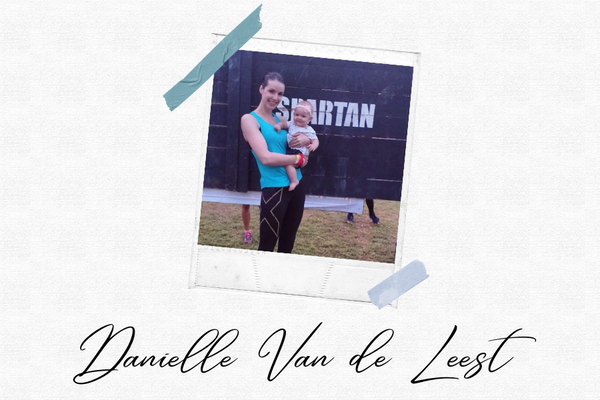
Danielle's journey in the world of sports began in her youth with dancing, gymnastics, and tennis, evolving into a passion that shaped her life. Now a mom of two young kids, she continues to find joy in sports and shares that with other women with her company activewoman.sg
"Motherhood has taught me to listen to my body and find balance in training and family life."—Danielle Van der Leest
What drives your passion for competition?
I grew up with sports around me. I started young with dancing and gymnastics and soon added tennis. I played tennis 2 to 3 times a week. During my teens, I really disliked running, though. Longer distances or more intense ones, and I would start to hyperventilate.
Around 16 years old, I started running because I thought it would keep me in shape. I was hoping to get started in modeling. In my twenties, I moved to Malaysia, where I continued running and started high-intensity workouts. I started my modeling career, and my main goal was to stay in shape. In 2015, I discovered obstacle races and enjoyed the combination of running and obstacles. I started with a bit of weight training and liked feeling strong. I also noticed an improvement in my running!
Since then, I have been combining running and weight training. I love it. Now I run because I enjoy it and it makes me feel good. I like seeing my progress when I'm consistent with it. Besides that, I love a bit of competition! It drives me to train harder. Having a goal in mind gives me added motivation to keep going.
At the moment, I am joining Spartan races and Hyrox. I've done a few half marathon races, 10 km, and the Standard Chartered full marathon.
How has motherhood impacted your fitness journey?
Motherhood has taught me to listen to my body and find balance in training and family life. It also taught me to slow down and the importance of strength training combined with running.
I stopped running before my first pregnancy per doctors' advice to have a better chance of getting pregnant. I ran for the first few weeks during pregnancy but soon didn't feel comfortable, so I switched to cycling. After my pregnancy, I was very keen to get back to running, but my pelvic floor and other muscles didn't agree with my fast pace back into it. I ended up with a bunch of injuries. I did rehabilitation work and managed to clear my first full marathon before the first year's celebrations of my daughter.
During my second pregnancy, I stopped running and purposely took a slower approach getting back to avoid injuries. Although I still love running and I am still competitive, I learned that, at this moment, being in the top 10 might not be my first priority anymore, and that is okay. Learning to balance family time, night waking, and running my own company has cut my time to training. But I still love it, and my husband and I now run together weekly to enjoy an hour of quality time together.
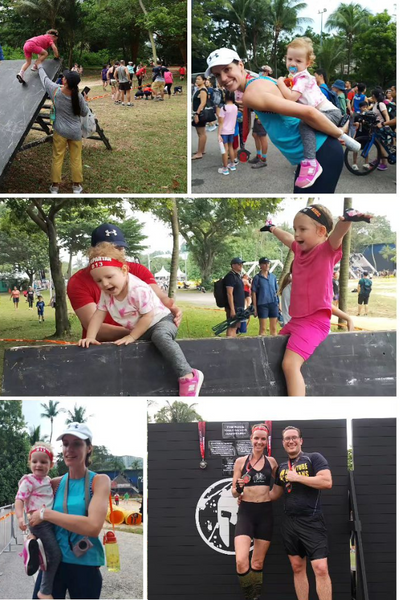
How do you maintain peak conditions, and could you highlight any specific routines crucial for your performance?
Ideally, there is a balance in rest, running, strength, and proper nutrition for maintaining peak conditions. Now, being a busy mom, this is sometimes challenging. Definitely the sleep part, with a 2- and 5-year-old who tends to wake up at night or early in the morning.
It's about controlling what you can control. Trying to make sure I always have at least 3 proper meals a day. I never work on an empty stomach because I know I get easily dizzy and shake when I don't eat enough. If my night wasn't great, I take a power nap when my schedule allows.
Ideally, I get at least 2 weekly runs and 2 strength training sessions. Anything extra is an excellent addition. Depending on what race I train for, I focus more on intervals or specific techniques. One month before the race, I will slow down with super intense workouts but keep a steady pace to avoid injury.
What are your go-to strategies for fueling before, during, and after races to ensure optimal endurance and recovery?
During the week, I run in the evenings and on Saturdays in the afternoon. I actually prefer the morning, but with my work and kids, my schedule doesn't allow it. My best runs are when I have enough sleep and enough food during the day. I usually have Greek yogurt with muesli, one piece of fruit, and a cappuccino for breakfast.
Mid-morning, have a protein bar, fruit, or biscuit. In the afternoon, I usually have 2 slices of bread with 2 eggs, and I need dinner at least 1 hour before my run, but ideally, 1.5 hours in between. If the run is after dinner, I must ensure it is light enough. I need some carbs because I can't run on only veggies and meat. I have half my plate with veggies, one quarter with protein, and one quarter with carbs.
After my run, I often drink a protein shake and some electrolytes.
Could you offer specific nutrition and wellness tips that have significantly impacted your athletic performance and overall health?
Most importantly, before you have any race, make sure you try your routine at the right time of the day. For evening or night runs, you need a different structure in what you eat than early morning runs. It's essential to find out what works for you before race day!
What's the best advice you've ever received on your fitness journey?
Enjoy it! Find something you enjoy! Do you hate running but need to do it to stay healthy? Try something else, like cycling, that you might want instead. Or instead of long distances, try switching it up with short, trail, or interval. Do what works for you. It's your fitness journey, and there is no clear-cut approach.
Need guidance on nutrition and gear? Our friendly RDRC team is here to help you on your sporting journey, no matter what stage you are at. Come down to the RDRC store at 108 Sims Ave, Singapore. Or check out the gear online at www.rdrc.sg
